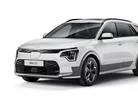Kia plans for sustainable change with EV business strategy

Korea’s oldest automotive manufacturer is one of many taking on the challenge to electrify its product range and deliver more sustainable solutions to customers globally as a heritage name in the sector.
The business altered its trajectory, which was formalised by new electric vehicle (EV) branding to signify a major commitment to a new era of automotive development. Having recognised this in a previous article, it’s about time we look at the car maker’s strategy for electrification, undergoing its bold and proactive approach to EV production.
The company’s latest technologies were showcased in the form of hybrid offerings and all-electric vehicles,of which the EV6 is one its most popular cars, sparking new excitement in battery-electric vehicles (BEVs). The Kia EV9 raises the bar further as it showcases the most recent technological updates provided by the Korea-born business.
In 2020, Kia launched its formal strategy for electrification known as ‘Plan S’. At the time of announcement, the company detailed its future endeavours, which include the introduction of 11 EVs by the year 2025, with a target of 6.6% of the global EV market share. By 2026, the plan is to sell one million eco-friendly vehicles; its annual sales target being 500,000. Beyond this, the company’s purpose-built vehicles (PBVs) will penetrate the corporate fleet market and customisations will be offered.
“Kia Motors will transform itself into a ceaselessly innovative brand by accelerating its bold and preemptive transition to future businesses,” said its President and CEO Han-woo Park at the time of delivering the strategy.
“As the auto industry undergoes turbulent changes, today is also an opportune time for Kia Motors to radically transform itself into a global enterprise dedicated to spearheading customer value-led innovations.”
Sustainability is the driver not a byproduct
The Plan S strategy goes hand-in-hand with Kia’s sustainability promise, which includes reaching carbon neutrality by 2045, which will largely be driven by its actions to deliver more EVs to the public and companies alike. Alongside this, sustainable mobility is key in its overall agenda, and energy is at the core of that. The company strives to meet the requirements of the RE100 global corporate initiative with 100% renewable energy sources to be adopted by the end of 2040.
More than ever, Kia is working alongside its partners to preserve and protect the environment. For parts suppliers, the company is establishing a greenhouse gas (GHG) emission data management system. The car maker also recognises the majority impact to be had in driving down steel production emissions. This is where the Green Steel Initiative comes in. The project will focus heavily on this area of the industry as a major contributor to its overall impact on the planet.
******
EV Magazine is dedicated to creating a global community of businesses, experts, and EV enthusiasts with comprehensive insights into automotive and the surrounding sectors.
For more EV insights check out the latest edition of EV Magazine and be sure to follow us on LinkedIn & Twitter.
You may also be interested in Sustainability Magazine and Energy Digital Magazine.
*********************************************
BizClik is a global provider of B2B digital media platforms that cover Executive Communities for CEOs, CFOs, CMOs, Sustainability Leaders, Procurement & Supply Chain Leaders, Technology & AI Leaders, Cyber Leaders, FinTech & InsurTech Leaders as well as covering industries such as Manufacturing, Mining, Energy, EV, Construction, Healthcare + Food & Drink.
BizClik – based in London, Dubai, and New York – offers services such as Content Creation, Advertising & Sponsorship Solutions, Webinars & Events.

